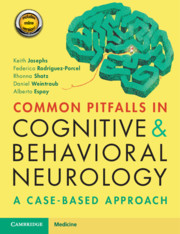Book contents
- Common Pitfalls in Cognitive and Behavioral Neurology
- Common Pitfalls in Cognitive and Behavioral Neurology
- Copyright page
- Dedication
- Contents
- Diseases Discussed in the Book
- Preface
- Acknowledgements
- Abbreviations
- Part 1 Missing the Diagnosis Altogether
- Part 2 Misidentifying the Impaired Cognitive Domain
- Part 3 Missing Important Clues in the History
- Part 4 Failure of Pattern Recognition
- Part 5 Difficult-to-Characterize Cognitive/Behavioral Disorders
- Case 21 Difficulty with Language: When Is It Not Aphasia?
- Case 22 Frontal, Parietal, or Neither?
- Case 23 Cognitive Impairment as an Unexpected Guest
- Case 24 Punch Drunk
- Case 25 Remembering without Knowing
- Part 6 Clinical Findings That Are Subtle
- Part 7 Misinterpreting Test Results
- Part 8 Attributing Findings to a Known or Suspected Disorder
- Part 9 Missing Radiographic Clues
- Part 10 Management Misadventures
- Index
- Plate Section (PDF Only)
- References
Case 25 - Remembering without Knowing
from Part 5 - Difficult-to-Characterize Cognitive/Behavioral Disorders
Published online by Cambridge University Press: 03 November 2020
- Common Pitfalls in Cognitive and Behavioral Neurology
- Common Pitfalls in Cognitive and Behavioral Neurology
- Copyright page
- Dedication
- Contents
- Diseases Discussed in the Book
- Preface
- Acknowledgements
- Abbreviations
- Part 1 Missing the Diagnosis Altogether
- Part 2 Misidentifying the Impaired Cognitive Domain
- Part 3 Missing Important Clues in the History
- Part 4 Failure of Pattern Recognition
- Part 5 Difficult-to-Characterize Cognitive/Behavioral Disorders
- Case 21 Difficulty with Language: When Is It Not Aphasia?
- Case 22 Frontal, Parietal, or Neither?
- Case 23 Cognitive Impairment as an Unexpected Guest
- Case 24 Punch Drunk
- Case 25 Remembering without Knowing
- Part 6 Clinical Findings That Are Subtle
- Part 7 Misinterpreting Test Results
- Part 8 Attributing Findings to a Known or Suspected Disorder
- Part 9 Missing Radiographic Clues
- Part 10 Management Misadventures
- Index
- Plate Section (PDF Only)
- References
Summary
This 65-year-old right-handed man presented with worsening “memory” problems for the past 5 years. He first noticed increasing difficulties with performing previously well-known and simple repairs at home, such as changing a light switch. A neuropsychological evaluation was reportedly normal. More recently, his family noticed declining skills in driving and use of appliances. In addition, performance of other tasks, such as preparing coffee, was affected by pauses and unnecessary steps. More recently, he was forgetful about recent events and unintentionally repetitive. There were no word-finding or navigation difficulties. On exam, he did not appear to be concerned about his impairments and inappropriately joked about them. His speech was fluent with occasional word-finding difficulties. He displayed optic ataxia and oculomotor apraxia, as well as simultanagnosia.
- Type
- Chapter
- Information
- Common Pitfalls in Cognitive and Behavioral NeurologyA Case-Based Approach, pp. 80 - 82Publisher: Cambridge University PressPrint publication year: 2020

